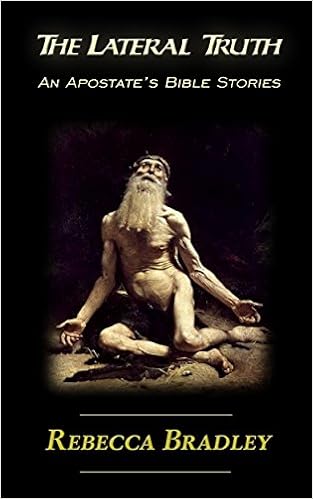By Rebecca Bradley
Was Moses really such a great liberator? How did a thug as thick as Samson get to be a hero? Wasn’t the miracle at Bethesda about as merciful as pulling wings off flies? The fifteen stories in “The Lateral Truth” follow selected biblical themes through to their illogical conclusions, building on questions the author was never brave enough to ask in Sunday school.
“Rebecca Bradley is a fabulous writer, The Lateral Truth is a witty and clever skewering of Bible stories. Funny and fresh – a much-needed antidote to rampant fundamentalism. Enjoy!” – Robert J. Sawyer, Hugo Award-winning author of Rollback.
“With skill, wit, and a keen nose for a good story, Rebecca Bradley reminds us that sacred cows must never be milked too seriously.” – Ronald Wright, author of A Short History of Progress.
Here are some Amazon reviews:
The Lateral Truth is a sendup of some favorite bible stories and Christian history, done in Rebecca Bradley’s inimitable style of entertaining wit, insight and unique perspective. She presents the tales from the different perspectives of lesser known participants in the stories, or by very human thoughts and feelings of familiar characters.
She begins the book with Omphalos, a tale of hope and exploration, transitioning into “a few years later” and how politics and the administrative process has sucked the life out of creation. The tale of Jacob is then related in sit-com style, which adds a new perspective not only to the story but makes one wonder how many other stories could benefit from this treatment.
Rebecca then adds darkness to the tale of Moses. It is told from just outside the inner circle and is voiced with frustration, fear, disgust, anger, and hoplessness. She shows, succinctly, how the right con-man/madman at the right place and time can start a cult. This is the strongest chapter in the book, in my opinion.
Immediately lightening the mood, Rebecca relates Samson as a fan in a bar may talk of their favorite sports team or hero. Following up on the sports motif, she relates Judges 19-21 from a soldiers point of view. The next chapter still hints at sport but with a poker or chess nature. The real twist is that the foes are trying to throw the game for their own egotistic purposes and they don’t care who gets decimated in the process. This provides good transition to the next chapter which pointedly indicates deities disdain for humankind.
Rebecca Bradley looks at some famous and some obscure passages from the Old and New Testament and gives the reader a rather tart reassessment of what it might have been like to actually live through those events, as compared with their conventional meaning. At times funny and at times disturbing, Bradley provides a credible alternative view to such Bible stories as Moses and the Exodus (think destructive cult leader), the construction of the Tower of Babel and the time that Jesus upbraided Martha for being too concerned about household chores. As a former follower of a cult leader, I recognized the potential truth in these irreverant takes on Bible stories which are normally glossed over or viewed with an uncritical eye.

